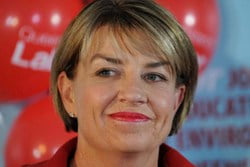Labor has suffered its worst defeat in Queensland in more than a century, crashing to a 26.9 per cent primary vote in the state election. The party’s embrace of pro-business policies disintegrated its support base.
Labor’s loss after almost 14 years in power was not a shock. But the huge scale of their defeat by the Liberal National Party (LNP) is astounding, with Labor likely to win just seven seats in parliament—worse than 1974.
Premier Anna Bligh drove the final nail into Labor’s electoral coffin just weeks after the last state election. Opinion polls showed around 80 per cent of people opposed the sell-off of Queensland Rail freight, forestry and the Port of Brisbane, but Bligh arrogantly pushed ahead.
The experience of job losses and declining public services, at the same time as water and power prices soared, caused mass disaffection with Bligh and Labor. Labor lost its support base in the unions and the working class, with unions sponsoring billboards up and down the state saying, “Anna Bligh sold us out.”
 The health department’s computer payroll fiasco went on for months, revealing the contempt the government had for the workers that kept the hospitals running.
The health department’s computer payroll fiasco went on for months, revealing the contempt the government had for the workers that kept the hospitals running.
Even now, the party’s leaders have learned nothing. Even as she acknowledged Labor’s massive defeat, Anna Bligh said she did not regret the privatisations. Bligh’s mentor, former Labor Premier Peter Beattie claimed in the aftermath of the election that it was only the privatisation “process” that was a mistake.
It was not only over privatisation that Labor chose a right-wing path. Labor’s budget policies consistently ran down spending on public services in order to give tax cuts to big business. Bligh turned her back on abortion law reform even after a woman in Cairns was charged under Queensland’s archaic anti-abortion laws.
Sadly The Greens were incapable of capitalising on the discontent with Labor. Their vote fell slightly on the previous state election, to 6.8 per cent. The Greens have done nowhere near enough to relate to working class voters—in the past the bedrock of Labor’s support base. The Greens were not identified with the opposition to privatisation, only with campaigns against coal seam gas.
The demoralisation with Labor went to the right, not the left. Bob Katter’s One Nation-style Australia Party won more of the protest vote, taking in 11.4 per cent.
Liberals take over
The victory for Campbell Newman and the Liberal National Party in the election follows the Liberals’ victories in Victoria, WA and NSW.
However, the huge vote for Newman does not reflect a new found popularity for pro-business policies in Queensland, but an immense frustration at Labor’s failure. Newman relied heavily on empty talk of “change”, rather than reveal his pro-business agenda or focus on his failed development schemes like the Clem 7 tunnel.
But the LNP will take confidence from their victory. Like the Liberals in NSW and Victoria, Newman will cut public spending, cap wages and attack public sector unions.
The new Liberal state governments have announced 3600 job cuts in Victoria and 5000 job cuts in NSW in the public sector.
Newman has already said he will look at selling off more public assets including the rest of Queensland rail. He is committed to tearing up the Wild Rivers legislation to allow the mining companies into Cape York. He will cut payroll tax on business further. He also plans to repeal civil unions for same-sex couples, one of Anna Bligh’s few progressive moves.
The Queensland result is a huge warning for Julia Gillard and federal Labor. Labor federally holds only eight of the 30 seats in Queensland. If the Queensland election vote is replicated federally, Labor is doomed. Kevin Rudd’s seat of Griffith would be the only one it would hold in Queensland.
A serious revival in Labor’s fortunes requires a shift to the left, and a break with its business-first neo-liberal policies. But there is no sign of this happening. Bligh’s resignation to parachute in some supposed future leader is just another example of the opportunist politics that has sickened Labor voters.
But most of all, standing up to Campbell Newman is going to take a revival of struggle. Strikes and protests by the unions could have beaten Labor’s sell-offs, but they held back from strike action and resorted to a bill board campaign. Industrial action by central Queensland coal miners has dramatically hit tonnage rates on the privatised QR National coal lines and the share price has fallen 3 per cent. Such action before Bligh privatised QR National could have stopped the sell-off.
The ETU and CFMEU’s donations to Bob Katter were a self-defeating extension of the idea that playing political games can substitute for industrial action. Shamefully, it also made it look like two progressive unions supported Katter’s disgusting homophobic TV ads.
Campbell Newman’s attacks on jobs, services and the environment will not be defeated by waiting for the next Labor government. The strike action of the Victorian nurses have shown how to fight a nasty Liberal state government—and win!
This is the kind of fight that is going to be needed if we are going to stand up to Campbell Newman, beat back the threat of Tony Abbott and fight for a real alternative to Labor’s pro-business policies.





